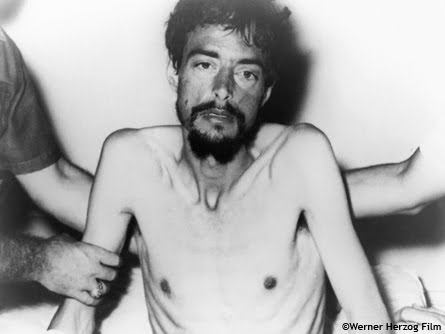
It is often the case that the medium through which one expresses themselves says more about both the work and the artist than the piece itself (ask McLuhan). Had Carolee Schneeman made hip-hop or David Byrne become a sculptor, their work and the discourse surrounding them would be totally different, even if her lyrics were that of "Interior Scroll" or the form of his sculpture evoked the mid-life ennui of "Once in a Lifetime". Rarely have I seen such a synthesis of medium and message as that evidenced by the works of Andy Goldsworthy, the subject of Thomas Riedelsheimer's documentary Rivers and Tides.
The film follows Goldsworthy as he travels into the wilderness to create works of art utilizing only the elements of nature.
Rivers and Tides does wonders with its simple premise; the camera simple observes as Goldsworthy painstakingly piles rocks or strings together leaves with pine needles. His work is meant to invoke the spirit of nature that flows through everything and everyone, and is more often than not personified as a wavy form reminiscent of a sidewinder snake. The film is largely about the creative process, and Andy's failures are just as affecting as his completed pieces. To see him put what seems to be his entire being into a complex mesh of free-hanging twigs only for the one over zealous addition and a gust of wind to turn it into a pile of sticks on the ground is nothing if not utterly devastating (think about how you feel after spending hours setting up a Domino Rally only to knock to table or accidentally hit the wrong domino with your ring finger). However these would-have been pieces make the successful works that much more breathtaking. I don't want to spoil too many more of the works shown in Rivers, suffice to say they are stunning achievements, representing the absolute pinnacle of harmony between man and nature. All of Goldsworthy's pieces are temporary and fluid, but Rivers and Tides is sure to stick in your mind for a long time. A-
Other semi-related thoughts:
-There seems to be a conflict in Goldsworthy's art; if it is in part about the beauty of nature, shouldn't nature alone suffice without a human's assistance? But I guess we're a part of nature too. Art, huh.











